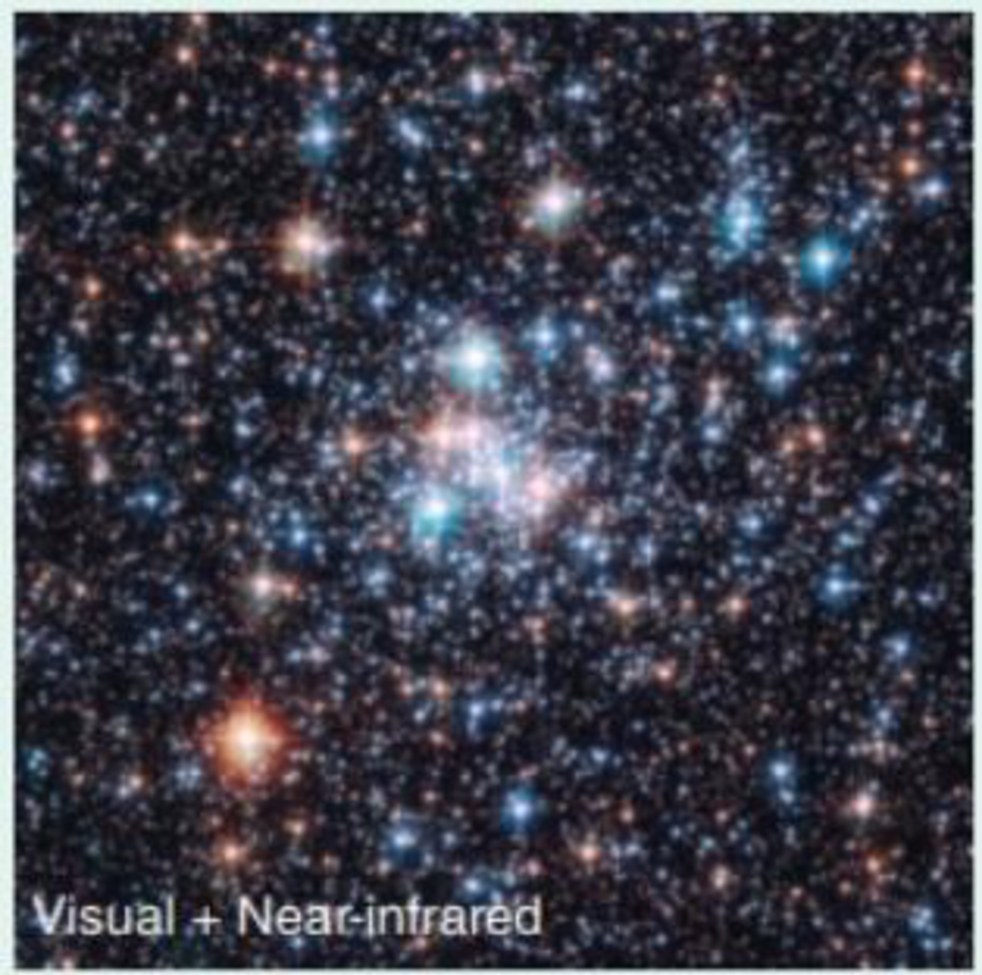
Foundations of Astronomy (MindTap Course List)
14th Edition
ISBN: 9781337399920
Author: Michael A. Seeds, Dana Backman
Publisher: Cengage Learning
expand_more
expand_more
format_list_bulleted
Concept explainers
Textbook Question
Chapter 25, Problem 2LTL
The star cluster shown in this image contains a few red giants as well as main-sequence stars ranging from spectral type B to M. Discuss the likelihood that exoplanets orbiting any of these stars might be home to life. (Hint: Estimate the age of the cluster.)

Expert Solution & Answer
Trending nowThis is a popular solution!

Students have asked these similar questions
Please don't use Chatgpt will upvote and give handwritten solution
how would i express force in vector form I keep getting a single number
please help me solve this questions. show all calculations and a good graph too :)
Chapter 25 Solutions
Foundations of Astronomy (MindTap Course List)
Ch. 25 - Explain how astrobiology is a science and not a...Ch. 25 - Describe one special quality of water that makes...Ch. 25 - Mars and Europa are two Solar System bodies that...Ch. 25 - How does the DNA molecule produce a copy of...Ch. 25 - What would happen to a life-form if the genetic...Ch. 25 - What would happen to a life-form if the genetic...Ch. 25 - What would happen to a life-form if the...Ch. 25 - Describe an example of natural selection acting on...Ch. 25 - Prob. 9RQCh. 25 - What evidence do scientists have that life on...
Ch. 25 - Define organic, as in organic molecule. How is...Ch. 25 - Why is liquid water generally considered necessary...Ch. 25 - Some meteorites contain organic molecules. What...Ch. 25 - What is the difference between chemical evolution...Ch. 25 - Prob. 15RQCh. 25 - Why was Earths early atmosphere able to support...Ch. 25 - Molecules of which gas were needed in Earths...Ch. 25 - Does intelligence make a creature more likely to...Ch. 25 - Describe one hypothesis for how cells first...Ch. 25 - What is the evidence that the first organisms on...Ch. 25 - Name three locations in our Solar System to search...Ch. 25 - Why are upper-main-sequence (high-luminosity) host...Ch. 25 - Prob. 23RQCh. 25 - How does the stability of technological...Ch. 25 - Prob. 25RQCh. 25 - Prob. 26RQCh. 25 - Why are scientists confident Earth has never been...Ch. 25 - Why does the Drake equation implicitly assume the...Ch. 25 - A single human cell encloses about 1.5 m of DNA....Ch. 25 - If you represent Earths history by a line that is...Ch. 25 - Consider Figure 25-8. What is the ratio of the...Ch. 25 - Suppose a human generation is defined as the...Ch. 25 - If a star must remain on the main sequence for at...Ch. 25 - Prob. 6PCh. 25 - If you detected radio signals with an average...Ch. 25 - Prob. 8PCh. 25 - The first radio broadcast was made on January 13,...Ch. 25 - Prob. 10PCh. 25 - The DNA in a single cell in your body contains...Ch. 25 - Prob. 2SOPCh. 25 - Look at Figure 25-11. Since the time we sent the...Ch. 25 - The star cluster shown in this image contains a...Ch. 25 - If you could search for life in the galaxy shown...
Knowledge Booster
Learn more about
Need a deep-dive on the concept behind this application? Look no further. Learn more about this topic, physics and related others by exploring similar questions and additional content below.Similar questions
- What is the force (in N) on the 2.0 μC charge placed at the center of the square shown below? (Express your answer in vector form.) 5.0 με 4.0 με 2.0 με + 1.0 m 1.0 m -40 με 2.0 μCarrow_forwardWhat is the force (in N) on the 5.4 µC charge shown below? (Express your answer in vector form.) −3.1 µC5.4 µC9.2 µC6.4 µCarrow_forwardAn ideal gas in a sealed container starts out at a pressure of 8900 N/m2 and a volume of 5.7 m3. If the gas expands to a volume of 6.3 m3 while the pressure is held constant (still at 8900 N/m2), how much work is done by the gas? Give your answer as the number of Joules.arrow_forward
- The outside temperature is 25 °C. A heat engine operates in the environment (Tc = 25 °C) at 50% efficiency. How hot does it need to get the high temperature up to in Celsius?arrow_forwardGas is compressed in a cylinder creating 31 Joules of work on the gas during the isothermal process. How much heat flows from the gas into the cylinder in Joules?arrow_forwardThe heat engine gives 1100 Joules of energy of high temperature from the burning gasoline by exhausting 750 Joules to low-temperature . What is the efficiency of this heat engine in a percentage?arrow_forward
- L₁ D₁ L₂ D2 Aluminum has a resistivity of p = 2.65 × 10 8 2. m. An aluminum wire is L = 2.00 m long and has a circular cross section that is not constant. The diameter of the wire is D₁ = 0.17 mm for a length of L₁ = 0.500 m and a diameter of D2 = 0.24 mm for the rest of the length. a) What is the resistance of this wire? R = Hint A potential difference of AV = 1.40 V is applied across the wire. b) What is the magnitude of the current density in the thin part of the wire? Hint J1 = c) What is the magnitude of the current density in the thick part of the wire? J₂ = d) What is the magnitude of the electric field in the thin part of the wire? E1 = Hint e) What is the magnitude of the electric field in the thick part of the wire? E2 =arrow_forwardplease helparrow_forwardA cheetah spots a gazelle in the distance and begins to sprint from rest, accelerating uniformly at a rate of 8.00 m/s^2 for 5 seconds. After 5 seconds, the cheetah sees that the gazelle has escaped to safety, so it begins to decelerate uniformly at 6.00 m/s^2 until it comes to a stop.arrow_forward
- A projectile is fired with an initial speed of 40.2 m/s at an angle of 35.0 degree above the horizontal on a long flat firing range. Determine. please help and show work for them so i can understand.arrow_forwardpls helparrow_forwardJ K L The graph in the figure shows the position of an object as a function of time. The letters H-L represent particular moments of time. At which moments shown (H, I, etc.) is the speed of the object the greatest? + Position H I K Timearrow_forward
arrow_back_ios
SEE MORE QUESTIONS
arrow_forward_ios
Recommended textbooks for you

 Stars and Galaxies (MindTap Course List)PhysicsISBN:9781337399944Author:Michael A. SeedsPublisher:Cengage Learning
Stars and Galaxies (MindTap Course List)PhysicsISBN:9781337399944Author:Michael A. SeedsPublisher:Cengage Learning Foundations of Astronomy (MindTap Course List)PhysicsISBN:9781337399920Author:Michael A. Seeds, Dana BackmanPublisher:Cengage Learning
Foundations of Astronomy (MindTap Course List)PhysicsISBN:9781337399920Author:Michael A. Seeds, Dana BackmanPublisher:Cengage Learning
 AstronomyPhysicsISBN:9781938168284Author:Andrew Fraknoi; David Morrison; Sidney C. WolffPublisher:OpenStax
AstronomyPhysicsISBN:9781938168284Author:Andrew Fraknoi; David Morrison; Sidney C. WolffPublisher:OpenStax Horizons: Exploring the Universe (MindTap Course ...PhysicsISBN:9781305960961Author:Michael A. Seeds, Dana BackmanPublisher:Cengage Learning
Horizons: Exploring the Universe (MindTap Course ...PhysicsISBN:9781305960961Author:Michael A. Seeds, Dana BackmanPublisher:Cengage Learning


Stars and Galaxies (MindTap Course List)
Physics
ISBN:9781337399944
Author:Michael A. Seeds
Publisher:Cengage Learning

Foundations of Astronomy (MindTap Course List)
Physics
ISBN:9781337399920
Author:Michael A. Seeds, Dana Backman
Publisher:Cengage Learning


Astronomy
Physics
ISBN:9781938168284
Author:Andrew Fraknoi; David Morrison; Sidney C. Wolff
Publisher:OpenStax

Horizons: Exploring the Universe (MindTap Course ...
Physics
ISBN:9781305960961
Author:Michael A. Seeds, Dana Backman
Publisher:Cengage Learning
General Relativity: The Curvature of Spacetime; Author: Professor Dave Explains;https://www.youtube.com/watch?v=R7V3koyL7Mc;License: Standard YouTube License, CC-BY